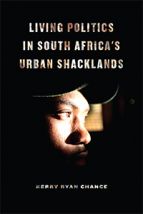Living Politics in South Africa’s Urban Shacklands

This book begins with a funeral. In the Durban settlement of Kennedy Road, Zithulele Dhlomo, a 27-year-old scrap metal collector, died in the two-room shack he inhabited with four other families. A candle set the plastic sheet walls on fire, and Dhlomo burned to death. Dhlomo’s death galvanized activists into demanding the electrification of the Kennedy Road shacks, so that residents would not need to rely on unsafe alternatives like candles. The problem was not that residents were ignorant of fire safety, as condescending NGO programmes implied. The problem was a lack of basic infrastructure – a responsibility of the government.
Living Politics in South Africa’s Urban Shacklands departs from Dhlomo’s death to explore urban social movements in post-apartheid South Africa, particularly the national network Abahlali baseMjondolo, with an ethnographic focus on the Kennedy Road settlement. Kerry Ryan Chance records how Abahlali’s activism is framed against South Africa’s political and economic liberalization. In this context, the term “living politics” (ipolitiki ephilayo in Zulu) encompasses protests along with “everyday practices of community building, such as occupying land, constructing shacks, and illicitly connecting to water and energy infrastructure” (page 4). Activists have used the concept of living politics to forge a space for their citizenship demands, which includes organizing around marginalized racial, ethnic and class identities.
Creatively, Chance structures the book’s chapters around the elements of fire (representing shack fires), water (representing water infrastructure), air (representing air pollution), and land (representing tenure and eviction). As one Abahlali press statement notes (page 41),
Yesterday Pemary Ridge…had their water disconnected. This is yet another act of direct aggression towards shack dwellers from [city government] that could cost lives…When the local Councillor…was challenged today he said that the water had to be turned off because people were ‘abusing it’ as consumption had gone up…It was pointed out to [him] that water consumption had gone up because the settlement had in fact grown from 50 families to over 200 families in this time. He was unrepentant…[Government officials] don’t realise that it is the utter inhumanity of their own policies that produces resistance.
Further reading:
Losier, Toussaint (2010), “A quiet coup: South Africa’s largest social movement under attack”, Abahlali baseMjondolo, 2 June, available at http://abahlali.org/node/6779/.
Magebhula, Patrick Hunsley (1994), “Evictions in the new South Africa: a narrative report from Durban”, Environment and Urbanization Vol 6, No 1, pages 59–62, available at https://journals.sagepub.com/doi/pdf/10.1177/095624789400600106.
Mitlin, Diana (2018), “Beyond contention: urban social movements and their multiple approaches to secure transformation”, Environment and Urbanization Vol 30, No 2, pages 557–574, available at https://journals.sagepub.com/doi/full/10.1177/0956247818791012.
Book note prepared by Christine Ro
Search the Book notes database
Our Book notes database contains details and summaries of all the publications included in Book notes since 1993 - with details on how to obtain/download.
Use the search form above, or visit the Book notes landing page for more options and latest content.
For a searchable database for papers in Environment and Urbanization, go to http://eau.sagepub.com/

